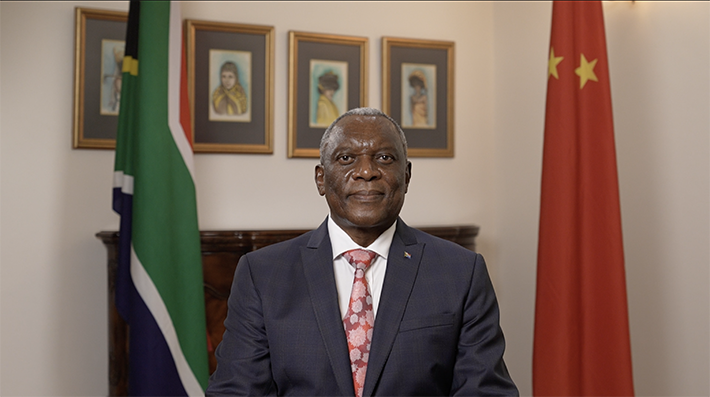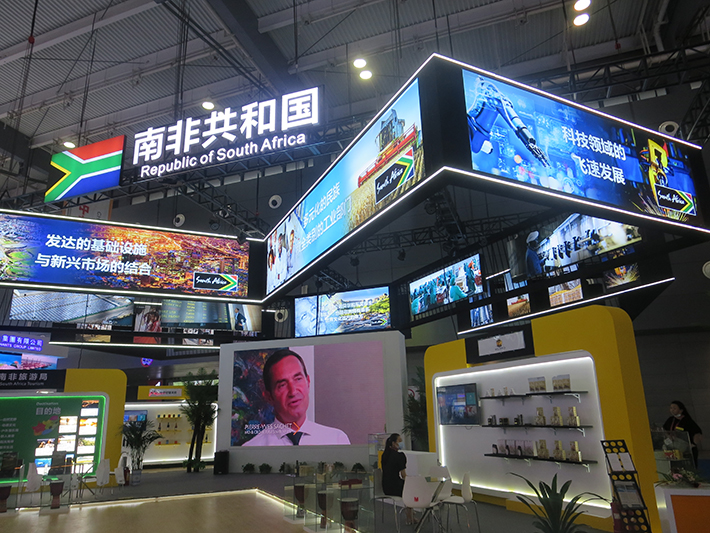|
||||||||||
| Home Nation World Business Opinion Lifestyle ChinAfrica Multimedia Columnists Documents Special Reports |
|
||||||||||
| Home Nation World Business Opinion Lifestyle ChinAfrica Multimedia Columnists Documents Special Reports |
| ChinAfrica |
| China, South Africa should strengthen economic ties for mutual benefits |
| China’s consistent support for South Africa’s development will benefit the people of the two countries well into the future, South African ambassador to China says |
| By Ge Lijun Web Exclusive ·2021-09-30 |

South African Ambassador to China Siyabonga Cwele (COURTESY)
The Second China-Africa Economic and Trade Expo (CAETE) in Changsha, capital city of central China's Hunan Province, is poised to maximize cooperation opportunities between China and Africa. At the expo, South African Ambassador to China Siyabonga Cwele gave an interview to ChinAfrica, highlighting the importance of economic and trade cooperation between China and South Africa.
ChinAfrica: Currently, the volume of South Africa’s exports of agricultural products to China is not big. How can the two countries bring more South African agricultural products to the Chinese market? What role can platforms like China-Africa Economic and Trade Expo play in it?
Siyabonga Cwele: The CAETE is one of the most important economic and trade cooperation platforms for deepening China-Africa cooperation under the Forum on China-Africa Cooperation (FOCAC) mechanism, which provides an opportunity and platform for African countries to showcase their strength and for Chinese enterprises to share their experience in various sectors. The second CAETE comes at a critical time as many of our economies have been hit hard by the pandemic. This event creates the ideal opportunity to promote a variety of our world famous fruits which have gained recognition in the North American, European and Middle Eastern markets.
While South Africa exports an extensive basket of products to these markets, the current framework of the exchange of agricultural products between South Africa and China is still in a developmental stage. The two countries are in the process of developing protocols for the export of additional South African agricultural products such as pears, avocadoes, soya beans, and dairy products.
At present there are a number of products that are available for export from South Africa, such as table grapes, red wine, tobacco, maize, lucerne, macadamia nuts, and beef. In order to boost sales of these products in China and divert a proportion of these products away from the traditional Western markets, we will bring more South African suppliers to China to forge relations with buyers in this vast market. However, this can only take place after the battle against COVID-19 is won.
A more long-term and sustainable option is for Chinese companies to invest in the agricultural value chains in South Africa. By integrating supply chains into specific product sectors, more products can be produced exclusively for Chinese consumption. Some companies have already done this in the wine industry and are operating successful businesses.
Further development of agricultural value chains is a key pillar of South Africa’s economic recovery, inclusive growth and industrialization strategies, opening up a myriad of opportunities for businesses, emerging entrepreneurs and rural communities.
South Africa’s agricultural exports increased by 3 percent in 2020 and reached the second-largest level on record, amounting to $10.2 billion, after the record exports of $10.7 billion in 2018. South Africa's agricultural exports are continuing to increase further in 2021 in spite of lockdown restrictions. The exceptional performance of agricultural exports has been primarily underpinned by large domestic agricultural output, which was supported by favorable weather conditions, which clearly illustrates the potential opportunity for increasing supply to China.

South Africa’s booth at the Second China-Africa Economic and Trade Expo in Changsha, Hunan Province, on September 27 (GE LIJUN)
The opportunities for further cooperation in South Africa’s agricultural sector are abundant. Our government is committed to ensuring that agriculture is amongst the key sectors for growth and the creation of jobs, supporting the export of South African fruit and other agricultural products to China as well as working with the Chinese Government to allow more categories of South African agricultural products into China. South African wine exports and sales to China have been at the historical high point over the past two years and will continue to grow. There remains great potential for strong growth of China-South Africa agricultural trade over the medium to long term, and we look forward to working with the Chinese Government and business partners to develop this important market.
The specific areas with investment opportunities include:
• Fruit and vegetable packaging and canning, juice processing;
• Oil seed production, edible oil processing, oilcake;
• Processing of soy-based products;
• Grain sorghum production, malt industry development;
• Nut farming (e.g. macadamia, walnut) and processing;
• Processing of organic, vegetarian and dehydrated foods;
• Meat processing, including ostrich meat;
• Expansion of dairy value chain;
• Expansion of bakery and confectionery production;
• Expansion of aquaculture (abalone, mussels, trout), and canning of freshwater fish.
According to statistics, more than 170 Chinese companies have invested in South Africa, and South Africa is the country with the most Chinese investment in Africa. How will South Africa further attract Chinese investment?
China and South Africa have a long-term friendship in many aspects since the official establishment of diplomatic relations in 1998. Our trade and investment have recorded positive progress. Since 2009, China is South Africa's largest trade partner, with both imports from and exports to China making up an integral part of South Africa's economic dynamism. South Africa’s exports to China stand at 64 billion yuan ($9.9 billion) in 2019, which makes up 11 percent of South Africa's total exports and creates thousands of jobs for the South African people. Given such close economic ties, investment naturally follows, especially among internationally oriented Chinese enterprises. Technology player Hisense recently invested $5 billion into new factory capacity in South Africa, joining Chinese brands such as Huawei, Haval, GWM, BAIC and JAC that have seen significant returns on investment in South Africa.
Investment has been more diversified and has targeted not only natural resources but also the automotive, chemical, energy and construction sectors. Chinese automobile brand FAW has already exceeded the $60 million cumulative investment since beginning operations in the country. Another project that truly underscores the benefit of China-South Africa cooperation and investment is the Mamba Cement plant in Limpopo Province, which now produces 1.1 million tons of cement annually.
In January, we have started the implementation of the African Continental Free Trade Area (AfCFTA) to boost intra-Africa trade and links with the outside world. This treaty is a historic development that promises to fundamentally reshape African economies. It will improve access to existing markets and lead to the creation of new ones. By investing and establishing a manufacturing base in South Africa, which has both developed infrastructure and financial network on the continent, Chinese companies will be able to export products duty-free to a growing African market of 1.37 billion people.
The government’s industrial policy has highlighted a number of priority industry sectors for rapid growth. The current sectors which have a direct link to industries in China are mining and minerals beneficiation, new energy with specific emphasis on renewables, agro-processing, automotive, and ICT.
However there are a number of other industries which present viable opportunities for Chinese investors. Pharmaceuticals and healthcare is one of the fastest growing sectors as a result of the pandemic and there are existing Chinese investors who are seeking to increase their investment in South Africa in the next 12 months.
As we foster more cooperation in post-COVID-19 economic recovery, we must encourage trade in manufactured value-added products. We must continue to jointly build efficient and modern economic infrastructure, increase trade and investment for the mutual benefit of our nations.
What has been the focus of cooperation between China and South Africa in the past three years? What are your expectations for the FOCAC meeting to be held this year in Senegal?
Since its launch in 2000, FOCAC has grown both in extent and scope. It serves as an effective platform for south-south cooperation focused on the tangible improvement of the quality of lives of all the people. The progress that has been made over the last 21 years demonstrates the tangible and lasting benefit of FOCAC to the people of Africa and to the people of China.
The relationship that we have forged through FOCAC is premised on the fundamental and inalienable right of the African people to determine their own future. It is premised on the African Union’s Agenda 2063, a vision that has been crafted in Africa by Africans. It is a vision of an integrated, prosperous and peaceful Africa, driven by its own citizens and representing a dynamic force in the international arena.
It is a vision of a continent where commerce, trade, investment, skills and knowledge move freely within the continent. We are working to build an Africa that is defined by good governance, democracy, respect for human rights, justice and the rule of law.
We look to China as a valuable and committed partner in advancing the Agenda 2063. It is in pursuit of this vision that we have embraced China’s Belt and Road initiative
As we look forward to the upcoming FOCAC meeting in Senegal later this year, we will seek to continue working with China through FOCAC and other forums to ensure that Africa’s development is prominent on the international agenda through partnership and investment in initiatives in areas such as industrial development, infrastructure, human resource development, healthcare, energy transition, green economy, and peace and security, among others.
Through this partnership, we are working together to advance growth and development on the African continent, people-to-people ties and youth development.
We have observed with interest and admiration China’s remarkable economic ascendance. We applaud its achievements in social development, lifting millions of people out of poverty. There are many valuable lessons that Africa can learn from China’s impressive growth model and its approach to meeting the needs of its people.
It is important also that we promote investment-led trade between Africa and China, which addresses the nature and quality of investment in Africa. We should seek inward investment that enables industrial development and the export of more value-added products.
The economic value of FOCAC – to both Africa and China – is particularly important in the context of an increasingly uncertain global environment. We should be using platforms such as FOCAC to reaffirm our shared commitment to multilateralism, a fair and transparent system of international trade and a global economic architecture that promotes the interests of the developing world.
Africa is the next frontier of growth in the world. In the coming decades, it will create many opportunities not only for its people, but also for economic partners such as China.
China’s investment in Africa, its strengthening trade ties and its consistent support for Africa’s development will benefit the people of Africa and the people of China well into the future.
| About Us | Contact Us | Advertise with Us | Subscribe |
| Copyright Beijing Review All rights reserved 京ICP备08005356号-5 京公网安备110102005860号 |